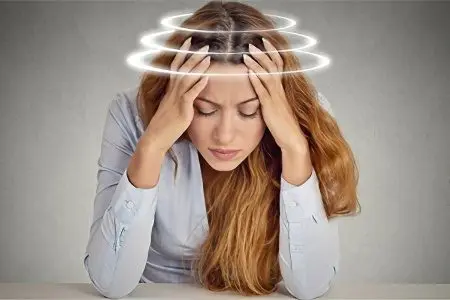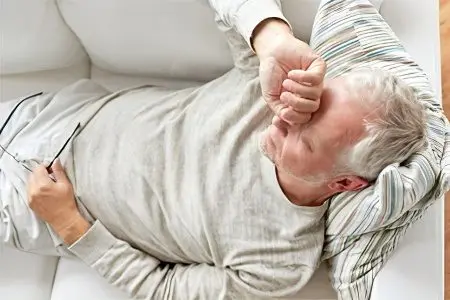Everyone has experienced dizziness at least once in their life. There can be many reasons for its occurrence. Sometimes the head is spinning for a completely harmless reason, for example, due to hunger or against the background of overwork. Although in some cases this symptom may indicate a developing disease.
What is dizziness?

Dizziness – this is a feeling of movement of oneself or things that are around. Very often people, coming to see a doctor, complain of dizziness. The cause of dizziness can be various diseases – both benign and very dangerous for human life. Approximately 80 causes have been identified that can cause dizziness, of which 20% combine a number of causes.
In a healthy person, the state of balance occurs due to a combination of signals from the vestibular, visual and proprioceptive systems entering the human cerebral cortex. Impulses that come from the cerebral cortex reach the skeletal and eye muscles, thanks to this, a stable posture and the desired position of the eyeballs are achieved.
In the event that the flow of impulses from the vestibular sections to the cortex of the temporal and parietal lobes is disturbed, an illusory perception of the movement of surrounding things or one’s own body occurs. Often patients misunderstand the concept of “dizziness”. Sometimes a person, experiencing a state of faintness, approaching loss of consciousness, a feeling of emptiness, “lightness in the head” perceives it as dizziness, although these symptoms of an approaching faint are combined with vegetative disorders, such as pallor of the skin, palpitations, nausea, blurred vision, hyperhidrosis (sweating). ). A similar condition can be caused by cardiovascular pathology, orthostatic hypotension, hypoglycemia, anemia, high myopia.
Often, patients under dizziness have in mind an imbalance, i.e., instability, staggering when walking. Such disorders can be after an organic lesion of the nervous system and, of course, are not dizziness.
Types of dizziness

Psychogenic dizziness: manifests itself after strong emotional experiences or because of severe fatigue. At the same time, a person feels a vague feeling of instability, ambiguity in the head, weakness. Pathological conditions that are accompanied by dizziness can be some mental syndromes – hysteria, depersonalization, anxiety with panic attacks.
Dizziness in brain disorders usually occurs due to pathologies of the cerebellum. It can be a tumor, displacement of the cerebellum with hydrocephalus, trauma to the skull or cervical spine, vascular disorders of the brain. Severe dizziness can signal a cerebellar infarction; this happens due to hemorrhage in the cerebellum if the patient is conscious. Damage to the autonomic nuclei, which are located under the cerebral hemispheres, is the second important cause of dizziness in cerebral disorders. This may be the result of inflammatory or vascular lesions, or in case of poisoning with chemicals or drugs. These drugs include barbiturates and anticonvulsants, which cause drowsiness and lethargy, dizziness. Excessive intake of streptomycin leads to irreversible brain damage.
Vertigo of the eye occurs in healthy people due to unusual visual stimulation (for example, the rapid movement of objects or at a height). The cause may also be the pathology of the eye muscles, that is, paralysis, which leads to a violation of the projection of objects on the retina and the “drawing up” of an incorrect picture in the brain.
Dizziness with ear pathology possibly due to damage to various structures: the vestibular apparatus, nerves and blood vessels, or the Eustachian tube (connecting the ear cavity with the nasal cavity). Dizziness associated with hearing loss, pain or tinnitus, or the appearance of dizziness with a certain position of the head may occur depending on the location of the lesion. The simplest cause of dizziness can be a sulfur plug in the external auditory canal.
Causes of dizziness

There are many causes of dizziness. It can appear due to damage to the inner ear or vestibular nerve. This dizziness is called peripheral dizziness. Various brain diseases can also cause dizziness, then it is called central dizziness. On the symptoms of dizziness and its nature, the frequency and duration of seizures can determine the actual cause of dizziness: if there are any discharge from the ear, hearing impairment, this indicates an inflammation of the inner ear and requires conservative treatment.
The main diseases in which dizziness appears are presented in the table:
Disease | Main manifestations |
VSD (dystonia) | Head spinning during a sudden change in body position. The attack is short, after a while it passes on its own. |
Diseases of the spine: its injuries, spondylosis or osteochondrosis | The person loses orientation in space. The dizziness becomes especially intense during the movement of the neck. Pain occurs in the same place. |
Migraine | The patient has tinnitus, the quality of hearing is impaired. |
Positional benign vertigo | At the same time, the head is spinning very strongly. The attack itself is short in time and develops when making a sharp movement of the head. |
Insufficient blood supply to the inner ear or brain | At the same time, patients complain of pain in the neck. The attack develops after a long static load in a sitting position. |
Psychogenic nature of dizziness | People with an unstable psyche are subject to such attacks. From time to time they experience confusion, they experience a strong fear of injury or fall. |
Anemia | Most often, dizziness with anemia develops in women. Other signs of anemia include increased fatigue and weakness, pale skin, and a tendency to faint. |
Vertebrobasilar insufficiency | In addition to the fact that a person is dizzy, he is sick, vomiting may occur. Patients often complain of headaches. Seizures are chronic. |
Neck injuries | At the same time, the neck muscles become tense, as the person has spent a long time in the same position. Then his muscles begin to hurt, after which the pain rises higher. A person begins to have a headache, and to a greater extent its occipital part. |
Inflammation of the inner ear and labyrinth | In addition to dizziness, the person will suffer from pain. |
Otitis | The patient has hearing loss and tinnitus. |
Otolithiasis | The patient develops benign positional vertigo, but the attacks do not last too long. At the same time, they are characterized by high intensity. |
Epilepsy | With epileptic seizures, the patient often experiences dizziness. |
Stroke | In this case, the head is very dizzy, vomiting may occur, speech is disturbed, coordination suffers. A person cannot orient himself in space, his muscle weakness increases. Sometimes the patient loses consciousness. |
Vestibular neuritis | Dizziness manifests itself with a sharp change in body position, or with a quick turn of the head. |
Agoraphobia | This phobia is associated with the fear of open space. Sometimes a person’s head is spinning even at the thought that he will have to go outside. |
Perilymphatic fistula | In addition to dizziness, a person experiences nausea and vomiting, hearing may deteriorate, and only from one ear. The attack happens unexpectedly for the patient. |
Meniere’s disease | In addition to dizziness, the patient feels sick, his hearing worsens, ringing in the ears worries. |
Growing neuroma (benign tumor) | This violation can lead to hearing loss, the inability to maintain balance. |
Taking medications | Antidepressants, NSAIDs, drugs for the treatment of malaria and cancer, antibacterial drugs, calcium channel blockers can provoke an attack of dizziness. |
Video: Live great! Dizziness. When can you not go to the doctor?









